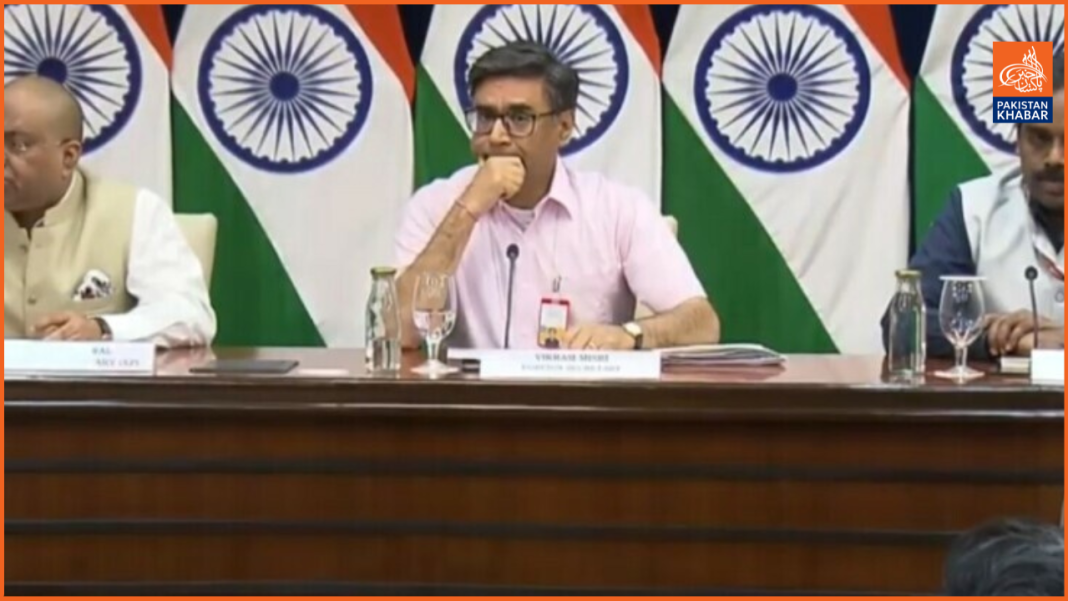National Security Committee meets these days as New Delhi suspends Indus treaty, closes border, halts visas, expels defence attaches. Foreign Office condoles deaths; Dar calls India’s ‘non-serious approach’ and punitive actions ‘immature’ Pahalgam attack kills 26; Indian soldiers chase assailant in various encounters Today (Thursday), the country’s top security body will evaluate India’s sharp response to a deadly attack in India-held Kashmir that killed over two dozen people and formulate a comprehensive policy response to New Delhi’s aggressive measures, which have raised Subcontinental tensions. The most serious Indian measure was suspending the Indus Waters Treaty. The 1960 World Bank-brokered accord has survived wars and decades of antagonism. Thus, its suspension changed the already tense relationship between the nuclear-armed neighbours. India shut down the main border crossing point, calling the act a grave provocation that required political, economic, and logistical pressure on Pakistan. India openly linked these actions to Islamabad’s alleged assistance for “cross-border terrorism”. Islamabad denied involvement in the incident. According to Deputy Prime Minister and Foreign Minister Ishaq Dar on X (previously Twitter), Prime Minister Mohammad Shehbaz Sharif has called the National Security Committee meeting for Thursday morning, April 24, 2025, to respond to the Indian Government’s announcement from this evening. On a private television program late Wednesday, Dar called India’s attitude “immature” and “hasty”. India hasn’t proven anything. They responded immaturely, Dar said. A nonserious approach. Right after the tragedy, they hyped it.” Earlier in the day, Pakistan’s Foreign Office expressed regret over the deaths. “We are concerned about the tourist deaths in Anantnag, Indian Illegally Occupied Jammu and Kashmir. The message offered condolences to the deceased’s family and wished the injured a fast recovery. Diplomats warn that India’s response and Pakistan’s counter-messaging might deepen bilateral relations, which have been strained since the 2019 Pulwama-Balakot crisis. Treaty suspensions can lead to long-term water disputes, and diplomatic downgrades can obstruct de-escalation attempts. Aggressive tactics After Tuesday’s Cabinet Committee on Security (CCS) meeting, Indian PM Narendra Modi announced harsh actions. The CCS was briefed on the 22 April 2025 Pahalgam terrorist incident that murdered 25 Indians and one Nepali. Others were hurt. Foreign Secretary Vikram Misri told a press conference after the CCS meeting said the CCS strongly denounced the incident, offered its condolences to the victims’ families, and hoped for the injured’s speedy recovery. “Recognising the seriousness of this terrorist attack, the CCS decided upon the following measures,” the statement said, suspending the 1960 Indus Waters Treaty “with immediate effect, until Pakistan credibly And irrevocably abjures its assist for cross-border terrorism.” “Integrated Check Post Attari will close immediately. It stated those with valid endorsements can cross over again before May 1, 2025. Pakistanis cannot go to India under the Saarc Visa Exemption Scheme. Previous SVES visas for Pakistanis are void. Any Pakistani with an SVES visa in India has 48 hours to leave. Pakistani High Commission defence attaches and advisers in New Delhi were proclaimed ‘Persona Non Grata’ and given a week to leave India. India will remove its Defense/Navy/Air Advisers from the Indian High Commission in Islamabad. Misri claimed the High Commissions will be reduced from 55 to 30. A statement claimed security forces were on high alert. The overseas ministry added, “As with the latest extradition of Tahawwur Rana, India may be unrelenting withinside the pursuit of these who’ve dedicated acts of terror, or conspired to make them possible.” ‘Loud and clear’ reply India’s defence minister promised a prompt response to the Pahalgam attackers and planners. On the day after gunmen massacred 26 individuals at a tourist destination in the disputed Himalayas, Rajnath Singh stated in New Delhi, “Those responsible and behind such an act Will very quickly listen our response, loud and clear.” “We won’t merely catch the attackers. We’ll also contact people who planned this on our land behind the scenes.” Singh stated, “India’s government will take every step that may be necessary and appropriate” but did not name the killers. A police-verified hospital report listed 26 men murdered on Tuesday afternoon when gunmen came out of jungles at a popular Pahalgam tourist site and raked crowds with automatic guns. Except for one Nepalese, all victims were Indians. Indian security personnel and suspected terrorists were allegedly fighting in Tangmarg, near Pahalgam, at press time. The army killed two persons in Baramulla on Wednesday following a “heavy exchange of fire” and said the gunmen were part of a “infiltration bid”, AFP reported. Leaders worldwide support Misri said several governments worldwide had shown support and solidarity. President Donald Trump was among the first to support New Delhi. According to UN spokesperson Stephane Dujarric, many US legislators and officials, including UN Secretary-General Antonio Guterres, strongly condemned the armed attack and sent their sympathies to the dead families. The Pahalgam incident upset Chinese Ambassador to India Xu Feihong, while France, Germany, the UK, and the EU voiced their sadness. Israeli and UAE foreign ministers also expressed support for the administration. The incident offered a “very serious risk of a new crisis between India and Pakistan, and probably the most serious risk of a crisis since the brief military conflict that happened in 2019,” according to analyst Michael Kugel Islamabad journalist Baqir Sajjad Syed and our New Delhi correspondent contributed to this report.
Must read
© 2024. Pakistan Khabar. All Rights Reserved.



